#queer mulan
Text
The Boss Music Starts Playing, Part 2/2 (Mulan)
This is a continuation of my previous post (link), because the original was too long for a single thing. So, I cut it down.
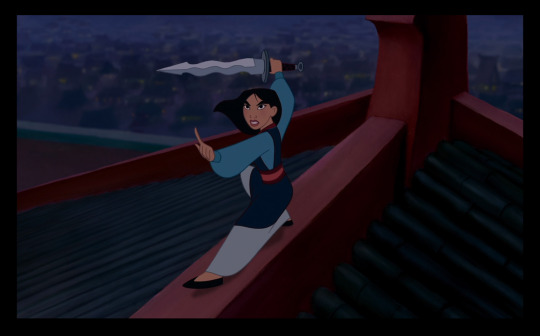
This relates to the theme of self-image really nicely. Because self-image, by definition, is how a person sees themselves. But it would be foolish to assume that how a person is seen by others doesn’t fit into this.
Shang’s self-image is centred around leading people, for example. That’s why he and Chi-Fu foil off each other, because Chi-Fu’s idea of himself is built on being in power over people. They are similar, but it is the nuances that set them apart, and that are at the root of Chi-Fu’s unmeritedly complex characterisation.
Chi-Fu is misogynistic doofus, but he’s also more nuanced than that, and honestly, he is one of the more interesting side characters in this film. He is a hypocrite, staunchly defending what he sees as masculinity while exhibiting exactly zero of the traits he places value in. He places value in rank above all else, willing to criticise those above him when he views their actions as unwise, but still following orders even when in doubt.
A lot of his characterisation is exemplified in this single line:
“Be careful Captain. The general may be your father, but I am the emperor’s counsel.
And oh, by the way, I got that job on my own.”
Here, he’s an eejit who throws his weight around. He respects the rank of Shang but takes care to position himself higher than him out of sheer spite.
But he’s also kind of correct. Like, I hate the fact that I am agreeing with this guy, but he makes a good point about the general’s nepotism here.
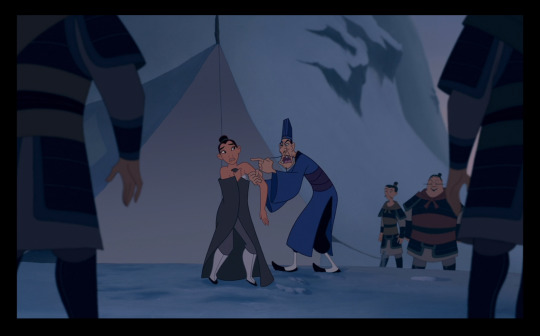
However, Shi-Fu is an antagonist in this film, and I don’t want to understate why he fills that role. Shi-Fu is misogynistic, unwilling to be swayed by Mulan’s displays of heroism because… well because she has boobs, and that disqualifies every point she can make. Again, he’s a misogynist.
Which brings me back to the thing about self-image and external perception, and I am going to bring back the non-binary reading. You can take the hormones, you can dress differently, you can do all kinds of things to make yourself feel more at home in your body. But all of those elements of self-image can be subverted by a single person misgendering you, or deadnaming you.
To those reading this who are not trans or non-binary, that is why we ask y’all to respect our pronouns. It’s not because we enjoy being contrarians (most of the time), it’s because referring to us in the way we see ourselves actually makes us feel better about ourselves. We’re asking you to help us in a way that objectively doesn’t cost you anything other than the effort to try.
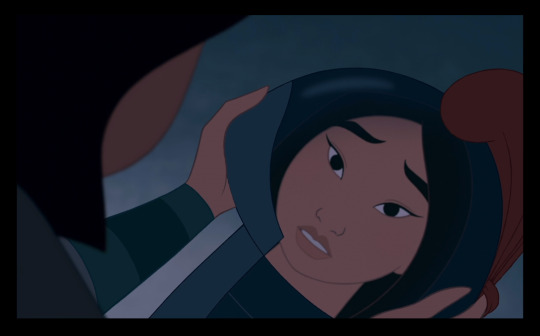
Mulan’s feeling of self-worth comes from her sense of belonging in the army, the place where she can be one of the guys, and people respect her for that and accept her as that.
When that image is shattered, and she is left out in the snow to die or go home, it is a gut punch because that belonging lets her go.
This post was inspired by Cinema Therapy’s video on Mulan, and while I joked around in the introduction about accepting their challenge, I think their video was really good, and I wish no I’ll will towards them. But…
I think it was a missed opportunity to not talk about the scene in the valley, because it is an incredible demonstration of what honour and self-worth actually are. They are both influenced by others, yes, but in the end, they are both something you find for yourself.
Mulan could go home, she has saved her father, she has proven herself, she has achieved what she came for. But she chooses to go back to the army and be a part of that, she chooses to go back to the life that Ping let her lead. Like the trial of the arrow, this is for her.
Which leads me into the two “fight scenes”.
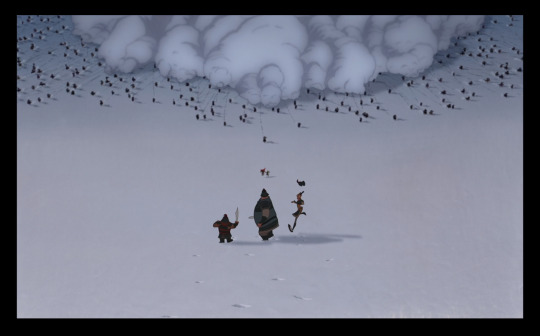
This is such well composed shot. Despite the utter lack of landmarks or even detail on most of the characters, you can see the scale and geography so clearly, and your eye is drawn to the stooges, then to the avalanche, then to Mulan and Shang sprinting away from it.
The three stooges carry this film, specifically in the matter of its tone. They set up the humorous, upbeat nature of the first half of the story with their antics and act as a benchmark for Mulan’s success in finding acceptance. Then they stop laughing to show the seriousness of the aftermath.
But here, the little spin that Lee’s helmet makes in the air serves to soften what would otherwise be a jarringly terrifying and gritty moment. They remind the audience what film they are watching and balance out the tone to distract from the visage of death behind them.
Anyway, Mulan’s actions in this battle and the final confrontation lean into a few readings.
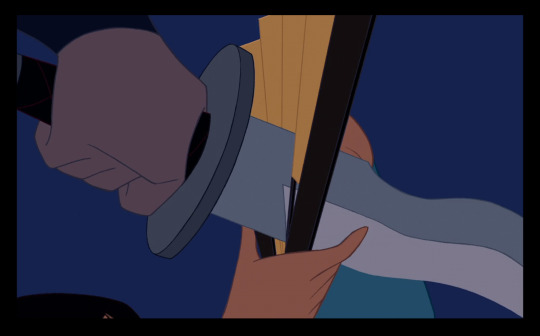
First, the feminist reading. I haven’t mentioned this as much as I probably should have up to this point, but the reading is by no means any less valid or prominent as any other.
This is a feminist piece, with Mulan defeating the Hun army twice by going against the masculine stereotypes. She reclaims her agency through being a badass alongside the men, but not in the same way as them. In the finale, she uses her fan, symbolically the thing associated with womanhood in the early stage of the film, to defeat the villain. She demonstrates that she has equal ability and right to be anywhere as the dudes, and in the end, the whole of China bows to her.
I’m obviously not a woman, so I’m not exactly the expert on this, but I can point out the obvious story beats, and I can step aside for people with a more nuanced understanding of this reading to let their presence be known.
Second, the trans reading, specifically a trans masculine reading. Once again, I am not trans, I am non-binary, so I’m going to give my understanding of this read from my limited perspective, and step aside again.
So, Mulan defeats Shan-Yu twice using the things she has learned as a soldier, sword fighting and cannons. These are parts of the identity that she has built for herself as a man, and her proficiency with them shows her expertise in the field of masculinity that she lacked in area of femininity, as demonstrated by the opening number.
When I ran a draft of this post by a trans friend of mine to make sure I wasn’t being inaccurate, he asked me to point out the fact that Mulan ends up with a scar in a similar place to those left by top surgery. So, there’s that.
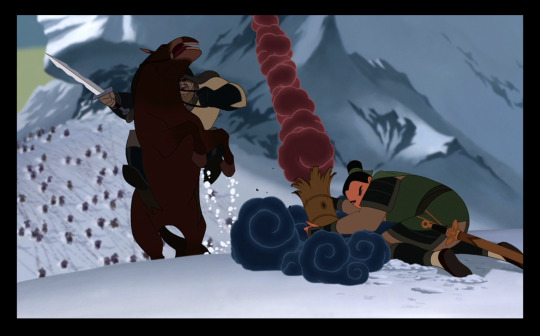
Finally, there is the non-binary reading of these scenes, which is where I get to go crazy with my own theories.
Mulan defeats Shan-Yu by thinking tactically, a trait not associated with either masculinity or femininity in this setting. Then, she uses both the fan and the sword, walking in both fields to accomplishing her goal, as if the concept of gender is irrelevant to her. She is neither man or woman, and both. Her gender identity cannot be defined so easily.
When Mulan is cast out from the army, that choice of whether to go back to being Mulan or try again at being Ping comes up, and her choice is a mix of the two.
“You said you’d trust Ping, why is Mulan any different?”
Mulan is Mulan, she isn’t trying to be Ping anymore, she’s trying to be herself. Now, she’s attempting to call on the clout and experience that that persona gave her, while distancing herself slightly from it.
Essentially, she isn’t entirely a guy, but she has some of the traits that are socially attributed to guys, and she is at home in the place that she carved out for herself. She is who she is, she cannot be classified. She is Mulan.
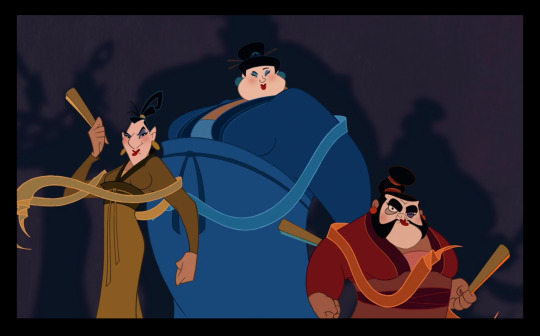
I love that the three stooges get to dress in drag for this moment, and I too lament the fact that Shang didn’t. But I also want to point out that, for all of modern media’s advances, this is the closest I have seen to a real fight sequence with characters dressed in drag. Come on Hollywood, you have the chance for the most epic sword fight ever shown, and you don't take it. Do it, you cowards.
That moment actually symbolises the breaking down of gender roles completely. Mulan walks between genders, and now these guys are free to exhibit their own masculimity in whatever way they see fit.
The moment is then played for comedy in a really cool way. It isn’t played as absurd at all. The comedy comes partly from the line “ugly concubines”, but also through the reverse of Mulan’s first scene as a dude.
The three stooges are comically really capable at pretending to be women and take to it ridiculously quickly. That is then contrasted with the fact that they don’t drop the disguises when they return to the actions they associate with masculinity, beating up people with excessive force, and even greet the emperor without changing. The stooges are confident enough in themselves and their gender that they can present this way without getting confused, and without stepping into Mulan’s theming as non-binary or trans or whatever your reading of her is.
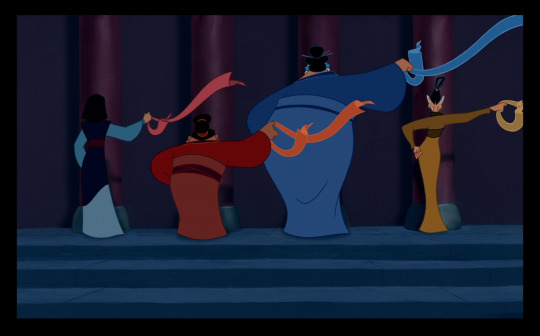
Unconditionally, the best part of this sequence is the music, bringing back Make A Man Out of You, specifically the final chorus (also the reveal of the drag is timed to the beat of the song, which is such a cool little detail). Everything I said about the unity of people working together with different strengths and weaknesses comes back. And the lyrics pair with the different forms of gender expression going on onscreen.
“Be a man.
We must be swift as a coursing river.
Be a man.
With all the force of a great typhoon.
Be a man.
With all the strength of a raging fire.
Mysterious as the dark side of the moon"
Shang’s hypermasculine soldier, the three stooges and their varying levels of manliness through their drag, and Mulan, all working together to succeed. Dressing in drag, being a general, being trans or non-binary, are all displaying the qualities of the song. Swift of mind, force of hope, strength of competence, mystery of individuality and interiority.
The actions reference the scene with the arrow in more ways than just the one, because this isn’t exactly the final chorus, it’s the chorus in which Mulan gets the arrow. The backing music was still there in that one, and it’s still there now. The main difference is that when we heard this first, Shang’s voice was leading the chant, but now he is either not there, or has joined the herd.
Catharsis.
Speaking of which, the scene where the emperor honours Mulan is nice and all, but it is secondary to the film’s final moments, and Mulan’s reconciliation with her father.
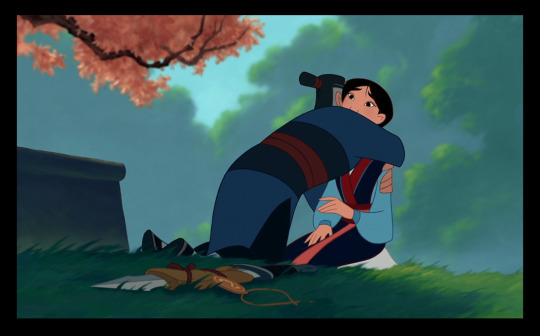
The gifts sit in the foreground here, but also in the shadows that Zhou has to move out of to get to his daughter. They are a reminder of what Zhou is stepping away from to hug Mulan.
This is acceptance on a familial level. Mulan is happy with herself, and she has found belonging in the army. Now she returns to her father, and offers him the gifts from the emperor, but Zhou discards them like they are nothing, because to him, that’s what they are.
This scene takes place in the same location as their conversation at the start of the film.
“What beautiful blossoms we have this year, but look, this one’s late. But I’ll bet that when it blooms, it will be the most beautiful of all.”
Zhou isn’t perfect, but I’ll challenge you to find a human being who isn’t, besides Oscar Isaac of course. However, he goes through substantial character development in the film behind the scenes in a way that is directly related to the events of the story.
At the start of the film, Zhou values his family, but instinctively his need for honour takes precedent. He will offer advice, and demonstrate his desire for his daughter to find herself in time, but he will undercut himself by his willingness to die for honour and for the hierarchy.
Then he loses his daughter, and he is told to make a choi
ce. He can get his honour back and expose his daughter, or he can stay behind. One will guarantee a reward, the other is a gamble, and without hesitation, he choses the risky option, because there is a chance his daughter will live.
He then has time to reflect over the course of the movie, that’s the development behind the scenes that I mentioned. So, when Mulan returns, and he sees the adult she has grown into, honour doesn’t enter the picture for him, and he accepts her for everything that she is.
Zhou isn’t perfect, but in the end, he is a good dad, and he improves as a person because of that. That’s what matters.
So, Mulan is a story about gender. Either from a feminine lens, a masculine lens, a trans reading, or a non-binary one, this film discusses gender, and how it relates to self-image and self-acceptance. The film talks about honour, and what that truly means, and it deconstructs the form of the musical itself to achieve it's points.
In other words, the writers during the Disney Renaissance were bloody good at their jobs, who knew?
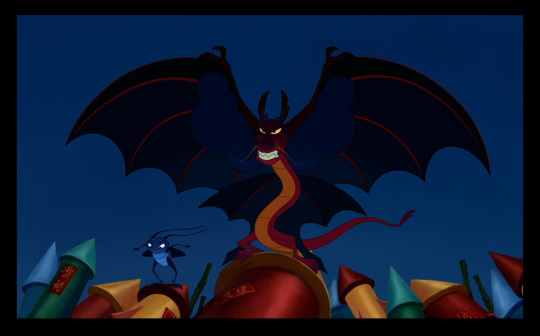
I love that the cricket is doing a Batman impression too. That's just golden.
Final Thoughts
Mulan is my movie. Not the sequel or the reboot, the 1998 original. Mulan is my movie.
It is a story about identity, and as a non-binary individual, this film shaped how I saw myself, and how I related to the world around me. It is also the direct cause of my obsession with cinematography. Mulan is my movie.
To the folks at Cinema Therapy, if by some miracle you read this, thanks. Your video was great, but it also inspired me to write this, something I am very proud of and something that helped me to articulate a few things that I have been struggling with. So, thanks for that.
Y’all stepped on my turf, walked into the labyrinth, and now the minotaur bows its head to you.
To everyone else, hello. I’m Ari, I make media analysis, so stick around if that interests you. Usually I don’t post things on Sundays, but I have a few things lined up, maybe keep an eye out for those.
Anyway, thank you so much for reading this (checks wordcount) 5000 WORD ESSAY. Dear Lord, this got long, and I haven't even mentioned the old married couple that is Mushu and the cricket, or their relationships with identity and gender. That might have to be a different post.
Thank you for sticking around.
#rants#literary analysis#literature analysis#what's so special about...?#character analysis#mulan#mulan 1998#fa mulan#disney mulan#disney princess#disney princesses#cinematography#cinema#lgbtqia#cinema therapy#watch movies#tumblr has an image limit so I had to cut down on some more finicky shot analysis#queer mulan#transgender#trans nonbinary#trans men are men#trans women are women#non binary#nonbinary#mulan is a queer story#meta#meta analysis
3 notes
·
View notes
Text
Queer subtext save me…queer subtext…save me queer subtext
#Merlin#bbc merlin#arthur pendragon#merthur#gwaine#she ra#Catradora#scorpia#glimmer#stranger things#byler#will byers#mike wheeler#el hopper#steve harrington#mulan#community#troybed#little women#jo march#josephine march#queer coding#gay coded#lesbian coded#bi coded#lgbt#lgbtq+
704 notes
·
View notes
Text
Disney songs that hit different when you're queer
"Reflection" Mulan (specifically if you're transgender)
"I'll Make A Man Out of You" Mulan (the transmasc euphoria song)
"Jack's Lament" the Nightmare Before Christmas
"Part of Your World" the Little Mermaid
"God Help the Outcasts" the Hunchback of Notre Dame
"I'm Still Here" Treasure Planet (specifically my transmasc anthem but my experiences are not universal)
"Out There" the Hunchback of Notre Dame (when you're closeted)
"Waiting On a Miracle" Encanto (when you're queer and religious)
"One of Us" Lion King 2
"How Far I'll Go" Moana ( when the people who raised you wouldn't let you be exposed to any queer media)
"Colors of The Wind" Pocahontas (the only good thing the Pocahontas franchise brought us was the soundtrack. When my friend was closeted she said to a girl who was being blatantly homophobic " you think the only people who are people are the people that look and think like you." Stopped her in her tracks!)
"Kiss the Girl" the Little Mermaid (but specifically when. You know what I mean lmao)
"When Will My Life Begin" Tangled
"Go The Distance" Hercules
"I Won't Say I'm In Love" Hercules
"One Jump Ahead (reprise)" Aladdin
"Proud of Your Boy" Aladdin Broadway musical
"If I Never Knew You" Pocahontas
Do feel free to add. Just don't let Disney see this
#be niceys to me i know my experiences are not universal#queer#queer Disney#gay disney#disney#the hunchback of notre dame#treasure planet#the little mermaid#mulan#tangled#hercules#aladdin#encanto#the lion king 2#moana#the nightmare before christmas
3K notes
·
View notes
Text
Do ya'll see... the vision?

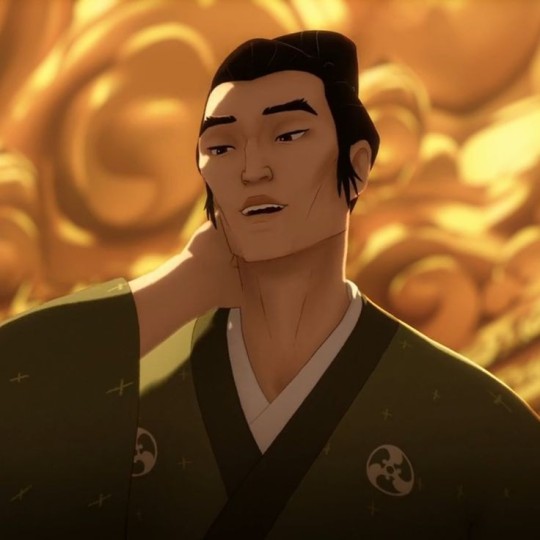
Do ya'll see the potential for another bisexual icon? That fell in love with a women but catching feelings thinking they're a guy? DO YOU SEE THE VISION?
#blue eye samurai#mulan#bisexual#mizu x taigen#taigen x mizu#mulan x shang#shang x mulan#shang#akemi blue eye samurai#akemi#taigen blue eye samurai#bisexuality#bi#bisexual icons#lgbt#lgbtq community#lgbt pride#lgbtq#lgbtqia#queer pride#queerness#queer community#queer icons#queer#lgbtq icons#lgbt icons#bes talk
813 notes
·
View notes
Text
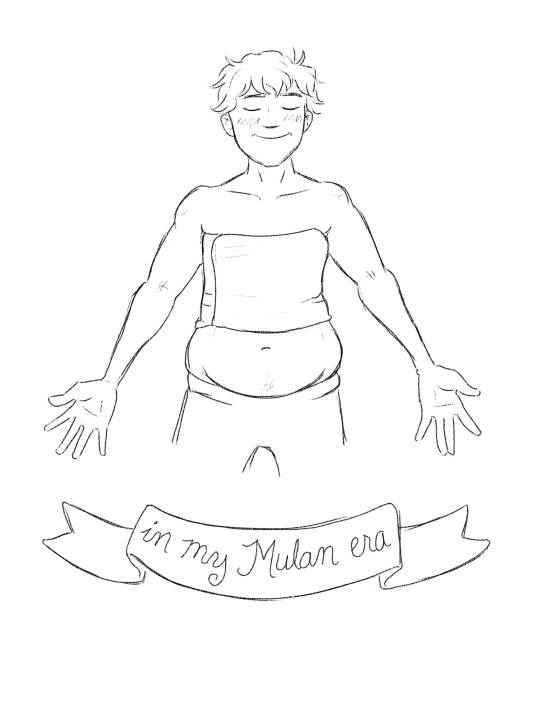
From my Top Surgery Recovery Sketchbook!
I had to wear this post-op compression binder for a month and this is how I made myself feel better about it, because obviously Mulan rules 🤘
I have a substack! Subscribing (free!) puts comics and sketches right in your email inbox directly from me! (There's also a $5/mo option if you want Secret Bonus Comics)
#top surgery#trans#transmasc#genderqueer#nonbinary#gender transition#transition stories#mulan#lgbtq#queer#sketchbook#disasters and other genders
453 notes
·
View notes
Text
The thing about Mulan (1998) is that she had to fully embrace her masculinity before she was able to accept her femininity and come to harmony with herself
#having some big genderqueer feelings over here#Mulan#nonbinary#queer#genderqueer#lgbtq+#she means everything to me
430 notes
·
View notes
Text
Did anyone else get really disappointed when Mulan changed back?
Yeah, we were robbed of the gay transmasc love story we deserved.
#lgbtq#lgbtqia#queer#bi#trans stuff#transgender#transmasc#trans men#transmasculine#ftm#trans#mulan#disney movies#disney#disney animation#don't you dare say I made your childhood gay#Shang is definitely bi#and was falling in love far before he knew Mulan wasn't a guy
84 notes
·
View notes
Text
Made a magnet from this post

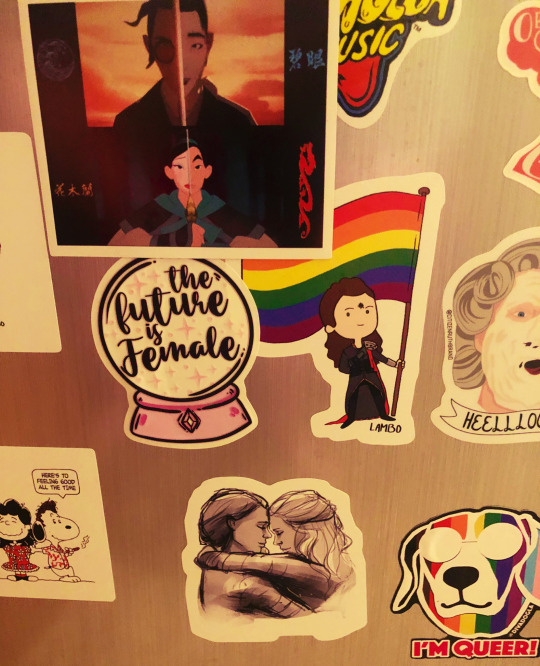
I added a dragon symbol for Mulan and a water symbol for Mizu as well as the titles of their respected show/movie! I think it goes well on my mini fridge🥰
#calling all artists! I desperately need a cool Mizu mulan shirt or better yet an enamel pin I will throw my money at you!!#I was going to make this into a shirt but I didn’t like the spacing on the chest#it would be cooler if the symbols were on the sleeves long length style but idk how to do that#or if there would be copyright🧐🧐#pokemon/wb have already taken down so much of my shit bc of iit lol#anygays#mulan#mizu#mizu blue eye samurai#blue eyed samurai#fa mulan#disney mulan#blue eye samurai#lgbt#queer#genderqueer#genderfluid#lgbt+ artist#akemizu#where is my mizu x akemi or mizu x mulan merch I so desperately yearn for?!?#p l e a s e#mizu is mizwife
113 notes
·
View notes
Text
Genderfluid but it looks like this
• Gremlin
• Mysterious bog creature
• Gender evil
• Material girl
• I'll make a man out of you
• Depressed
• Seriously. What the fuck
(I'm technically genderfluid but I still use the label genderqueer. I never feel entirely feminine or masculine)
#madonna#material girl#ill make a man out of you#mulan#genderfluid#genderqueer#queer#lgbtqia+ community#lgbtqia#gender#tw depression#tw swearing
16 notes
·
View notes
Text
LGBT actually stands for
LET'S
GET DOWN TO
BUSINESS TO DEFEAT
THE HUNS
#mulan is the transmascest film#disney mulan#mulan 1998#lgbt#lgbtq#lgbtqia#finch rambles#trans#transgender#trans joy#queer positivity#trans kids#trans community#aqueerjokeaday#queer jokes
102 notes
·
View notes
Text
got around to reading that article about queerness in mulan (the one that james somerton plagiarized from, lmao) and i am once again reminded of how formative this movie was for me. yeah guys the protagonist doesn't fit into either traditional male or female gender roles. the protagonist looks at her reflection and wonders whether if it will ever reflect who she is on the inside, because if that true self is shown to the world it would disappoint her whole family. the protagonist fails at the being-a-wife test. that's SO CRAZY
#every queer asian person that has a personal connection w this movie lets all form a big group hug#who am i.txt#on another more unhappy note it's genuinely sinister that james somerton took this into his video essay#and erased the parts jes tom wrote about them being chinese and connecting to mulan through that#like wow dude. what the fuck??! evil behavior. you're quite literally whitewashing their experience#to make it palatable as possible to your youtube audience. fuck off
31 notes
·
View notes
Text
The Boss Music Starts Playing, Part 1/2 (Mulan)
Mulan is my movie. Not the sequel or the reboot, the 1998 original. Mulan is my movie.
It is a story about identity, and as a non binary individual, this film shaped how I saw myself, and how I related to the world around me. It is also the direct cause of my obsession with cinematography. Mulan is my movie.
But I haven’t really mentioned it much on this blog before. This is the place where I rant about whatever piece of media takes my fancy, but Mulan has been conspicuously absent. I nearly devoted a series of my musical analysis to this film, for example, but didn’t for a reason I will get into.
However, on May 1st, four days before this post will go live, the folks over at Cinema Therapy uploaded a video titled Psychology of a Hero: Mulan. This was part of their series of breaking down characters from various films and TV shows to give their take from the perspectives of a licensed therapist and a professional filmmaker, and the video was better than good.
Now, I am neither a therapist or a filmmaker, but I do have opinions about the film, and I will not be outdone.
These boys stepped well and truly onto my turf, and I think it’s time to make my presence known.
Light the signal fires, we’re going to war.
Let me explain.
SPOILERS AHEAD: (Mulan)
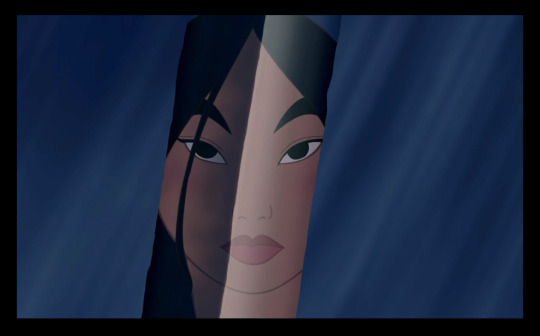
I think it’s important to start off with how different Mulan is from every other Disney Princess. Because she technically is one, and that draws unflattering comparisons. It doesn’t matter what you do, when you are compared with Mulan, you will fall short.
Mulan is a psychologically complex character in a way that not many other Disney Princesses can boast. Ariel comes close, but in a very different way (unless you squint), but the others, while nuanced, aren’t as focused on the internalisation as Mulan.
Case and point, the “I want” song. In the Princess and the Frog, Tiana wants to open her own restaurant. That’s an external conflict, and one with measurable success criteria. Similarly, Moana wants to explore the world, again, external. Belle wants adventure and for her life to be more like the books she reads. Also external.
Mulan wants to be happy with herself.
All of these characters get secondary goals over the course of their stories. Tiana wants to get back to being human, Moana wants to save her people, Belle wants to save her father, and Mulan also wants to save her father.
But hold on to Mulan’s stated mission here, because it gets funky, and I will talk about that later.
Reflection forms a neat bait and switch with Honour to us All, because the first song of the film sets up a core conflict, and then Reflections inverts that.
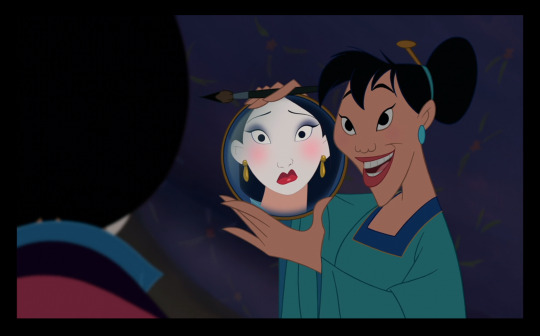
I have a deep love for mirrors as symbolism in films. I think they are the easiest and most effective visual metaphor out there, and I think there is merit to my opinion. But I am fully aware that I have a bias shaped very specifically by this film.
Honour To Us All is a jaunty little song about what it means to be a woman, and it’s a song about aesthetics.
“Wait and see
When we're through
Boys will gladly go to war for you
With good fortune
And a great hairdo
You'll bring honour to us all”
All Mulan has to do is look the part, and she will fit perfectly. Combine this with the visuals of a makeover that rivals every film Anne Hathaway has ever been in, and you could almost miss that everything I have just said about this song is a lie.
“We all must serve our Emperor
Who guards us from the Huns
A man by bearing arms
A girl by bearing sons”
This song does some serious thematic setup about the gender roles of the society it is depicting. It goes into depth about what a woman must be (calm, obedient, work fast paced, etc.), but there’s also the fact that all men have to be soldiers.
Throughout the song, however, Mulan demonstrates her core strength, ingenuity. Mulan is a tactician, able to outwit people in games of strategy, as well as cheat at homework and chores. She works smarter, not harder.
Enter the Matchmaker, played by Miriam Margolys, who makes my point for me.
“You are a disgrace! You may look like a bride, but you will never bring your family honour!”
It turns out aesthetics are secondary to behaviour. The matchmaker essentially tells Mulan that her image doesn’t match her identity, and that she isn’t very good at being a woman. Which, for as much of a terrible person as the character is, is a remarkably accurate observation.
“Look at me
I will never pass for a perfect bride
Or a perfect daughter
Can it be
I'm not meant to play this part?
Now I see, that if I were truly to be myself
I would break my family's heart”
There are two main readings of this song, both of which I agree with, and I don’t think are actually that separate.
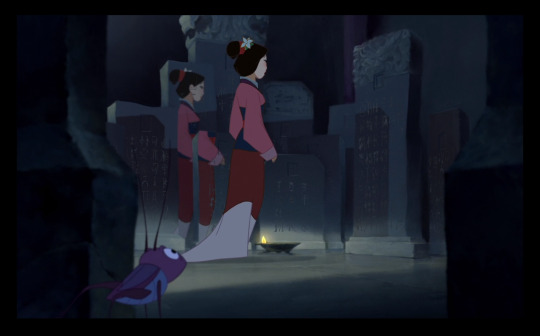
There is a hall of mirrors effect going on in the family temple. But it is made up of stones that represent the ancestors. Everywhere Mulan looks, she sees people expecting her to be something she is not, people she has brought dishonour to because of who she is.
The first is that this is a person who doesn’t fit in and can’t fulfil societal expectations. This is someone who’s in doubt about their dreams and doesn’t want to tell her family about that. This is a story about society not accepting individuality.
The second reading is that this easily the single most overtly queer song ever written, with themes of gender non-conformation. Mulan is a trans icon for good reason, but she also works as a non-binary hero as well for similar reasons.
Mulan doesn’t pass as a perfect daughter or a bride, is it possible that she was never meant to be a daughter or a bride at all? A ton of trans folk describe their experience in an extremely similar way to this, they were born the wrong gender, and now they are the person they were always meant to be.
On the same note, the last two lines will strike a chord in the heart of any queer person, trans or not, because coming out to your parents is a really difficult thing to do. Even if you have understanding parents (which, unfortunately, isn’t as common as I would like it to be), it’s still expecting people to accept a pretty core part of your identity. It’s vulnerability, and Mulan’s fear of breaking her family’s heart isn’t fear of them, but of herself. Mulan is terrified that she will hurt them by being who she is.
“Who is that girl I see
Staring straight back at me?
Why is my reflection someone I don't know?
Somehow I cannot hide
Who I am, though I've tried
When will my reflection show who I am inside?
When will my reflection show who I am inside?”
If you want a brief summary of what gender dysphoria feels like, I can’t speak for every trans or non-binary person (every experience is unique and equally valid), but at least to me, this song is pretty accurate.
On a personal note, I am non-binary, I undulate between they/them pronouns and he/they pronouns, but I am also fairly masculine presenting. This isn’t a part of myself that I find particularly fun. I like being able to sing bass, don’t get me wrong, but that pales in comparison to the fact that when I look in the mirror, it’s like I’m looking at someone else. I don’t associate my appearance with myself, which is frustratingly difficult to articulate, but more importantly, it has a rather large impact on my self-image.
My reflection doesn’t show who I am inside.
This song is why Mulan is a trans and non-binary icon. The plot itself doesn’t actually do much. It’s a story about someone following her own interests above the expectations of society, but this song reframes the entirety of the musical.
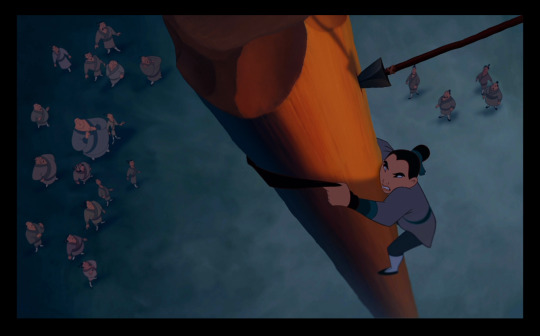
Make A Man Out Of You has some definite coding in it, but not in the way that people often associate. Yes, Mulan’s struggles to “be a man” are trans affirming, as they show someone gradually becoming more confident in her own skin.
But it’s the moment with the arrow that means the most to me.
“You're unsuited for the rage of war
So pack up, go home, you're through
How could I make a man out of you?”
This should be a victory. Mulan came to the army to protect her father, she doesn’t care about personal honour, so getting told she can leave with no questions asked should be an easy deal. Except once again, that’s not entirely accurate.
Mulan doesn’t start caring about personal honour, but she finds that drive in the army. So, the decision to complete the task on her own terms, because she wants to, is an important moment for her identity. Mulan is offered the chance to go back and be a daughter, or she can prove herself to be a man, and she chooses to stay.
However, I would argue that the non-binary reading comes in here, because Mulan doesn’t solve the problem in the way that is expected. She solves it in her own way. She succeeds in the life she chooses by playing by her own rules.
An understated element of this scene is the timescale it takes place in. Mulan is told to go home late at night, but its implied to be the evening. She then stays up all night to get the arrow.
The fact that its dawn for the shot in which she swings the two weights together implies that this isn't the first time she has done this, she has kept trying, and failing, but is powering through it to succeed.
Endurance is a key part of masculinity in this setting, at least according to the visuals of this song, and Mulan has just demonstrated that, while doing things her own way. She has utilised discipline and strength, and she has utilised her own ingenuity. Either she is just as much of a man as everyone else, she just comes at it from a different angle, or she is neither man nor woman, she is Mulan.
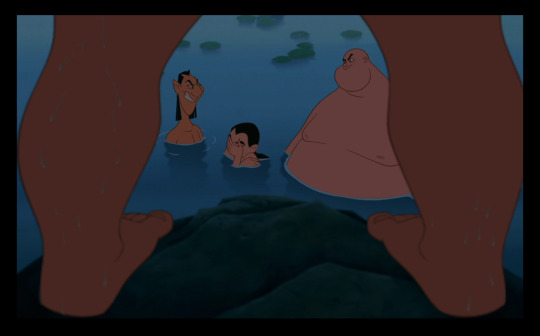
I think the moments in which the film goes out of its way to show Mulan’s separation from the men emphasise this reading.
“Just because I look like a man, doesn’t mean I have to smell like one.”
Notice how femininity isn’t mentioned here at all. Mulan is distancing herself from the idea of masculinity as presented in the story. To me, this comes across as someone who is neither a woman or a man, but something else, someone who falls out of the gender binary.
As a side note, the final chorus of Make a Man Out Of You plays really weirdly into the story’s idea of individuality and place, by showing the power of the cast of heroes through their synchronisation.
One of my favourite elements of the film is its visual identity, especially its character design. Because even the extras have all distinct styles and shapes, everyone in this world is unique. From the goober with the scam tattoo to the angy chef, everyone is their own person.
Even the silhouettes are different and distinct. I’ve seen arguments online as to the importance of silhouette in character design, and while I don’t think it’s essential, it’s a tool that can be used for scenes like the one in Reflection. There, the father and mother can be clearly read as each other, but their actions are also clearly identifiable as well, which helps to communicate their story through the barrier that Mulan is feeling.
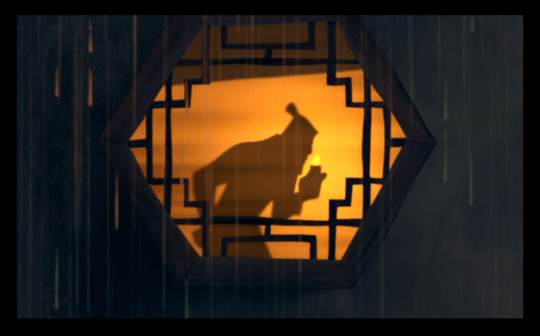
This then relates to the army, and people’s strengths and weaknesses. The build up to this song does an incredible job of characterising the three stooges.
Yao is brave to a fault, with a hot temper and a defiant determination that lets him, within ten seconds, barely blink in response to an arrow being pointed at him, and then try to climb with his teeth.
Chien-Po is calm and quiet, and the team cleric, essentially. He has an ability to defuse almost any situation, including the anger of Yao, but that translates into meekness and a lack of confidence in himself.
Lee, meanwhile, is charismatic, but that has come at the cost of most other aspects of his life. He isn’t wise or strong, and his intelligence is dubious. But weirdly, he’s a natural born leader.
The montages in Make A Man Out Of You then show off their development. Yao goes from letting his emotions rule him in the flaming arrows task, to a confidence that replaces his arrogance; Chien-Po develops a faith in himself that lets him move through the balancing test with ease; and Lee leans to prioritise technique over brute force to complete the same task.
But then that final chorus comes in, and the backing music cuts out to become only the vocals singing in unison, and you realise what this song has been playing at the entire time. Individualism is great, but individuals need to bounce off of each other and balance out each other’s strengths and weaknesses. That’s something just as vital when singing a cappella as when fighting in an army.
The song is also a mirror to Honour To Us All and continues to hammer home its theme of gender and gender expression. Blokes have it a lot easier than the ladies in this culture, but that doesn’t mean they are free from expectations.
“Tranquil as a forest, but on fire within.
Heed my every order, and you are sure to win.”
Guys have to be strong and warlike; they have to be obedient; they have to be willing to die. But also, there is the idea of “boys don’t cry” here. A guy must appear stoic, like nothing in the world can alter him, but he should be burning with rage inside. Bottle up your emotions until they explode. That doesn’t exactly strike me as the healthiest of expectations for anyone.
Essentially, Make A Man Out Of You is storytelling through song, which is the core mechanic of musicals.
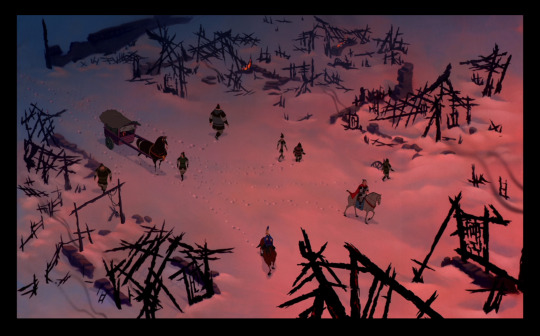
Speaking of which, I didn’t end up doing a series on Mulan because calling it a musical is a little bit inaccurate. Mulan is defying its form by abruptly and abrasively ceasing to be a musical at the fifty-minute mark. In a film that is an hour and twenty minutes long.
Mulan’s final song is A Girl Worth Fighting For, which is a great song, but is an abysmal finale song, and that is the point. The tone shift is meant to be a gut punch, and it is meant to change the trajectory of the story.
This may seem like an obvious statement for a discussion of a musical, but the sound design of this film is phenomenal. Although the key to this isn’t the key numbers, it’s the quiet things. The ambience at the camp, the fact that the cricket becomes a typewriter for a scene, the musical flourish that is Mulan stealing the armour and how that incorporates her lite motif, and it’s the fact that the sound design of this movie knows when to shut up.
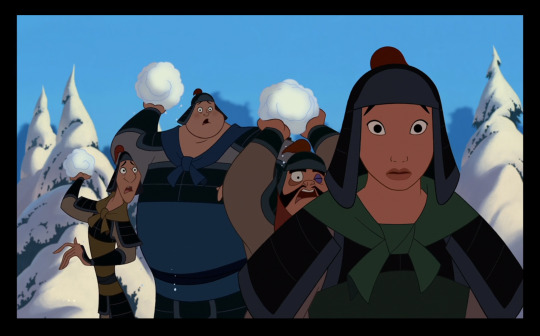
One minute. The dialogue cuts off for one minute exactly, kinda. Not a lot of time, but it feels like an eternity.
The song abruptly shuts down and the audience is witnessed to complete and utter silence as they take in the devastation. Then the wind starts to blow as they progress further into the disaster before a musical sting emphasises the horror of the moment.
Although the order in which that happens is interesting. The song has been playing with a stable loop of keys to ground itself. Then that abruptly cuts off as it is gearing up to a bombastic finish, but the camera is looking at Mulan and the three stooges.
You get a fun moment, then you see the shock on their faces, then you see the devastation. The emotion could be anything, but that fraction of a second crystalises it into dread, rather than loss, and that's the emotion that the rest of the scene builds on.
The colour palette even shifts, matching the smoke and the fire, but also implying the crimson of blood.
“Search for survivors.”
Shang gives an order in an attempt to break the silence. It’s an attempt to break the mood both a diegetic and non-diegetic sense. Shang is trying to find a purpose against the bleakness and trying to create noise again, but then the atmosphere consumes him, and he is gone.
Another musical sting hits as Mulan finds the doll, and the personal tragedy of a child whose name cannot be known becomes excruciating.
Then we see the battlefield, and besides the obvious, there are a few things that should be stated.
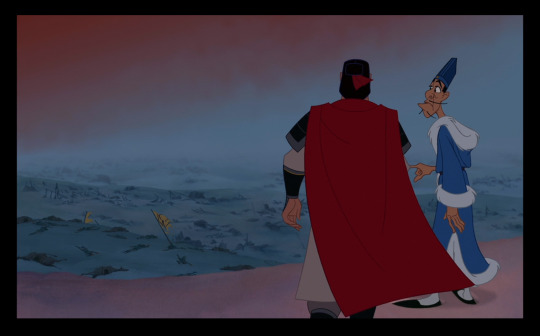
One, this instantly stops Chi-Fu and Shang from bickering. There is a slight moment of trust that develops between them, as, for all his faults (and there are many of those), Chi-Fu instantly empathises with Shang’s emotions, and becomes a comforting force.
Two, the battle didn’t happen in the village, if it did, there would have been a sign of soldiers within its walls. The battle took place down the hill, there was no reason for the village to be destroyed. This is the first time we actually see the scope of the villainy of the Hun army.
Up until now, Shan Yu has just been intimidating. He orders the death of a messenger, but that’s just one guy, and this is a war story. That just sets him up as villain with an easy “kick the dog” moment, but it’s not grand scale.
Here, it becomes that. This is a display of power, in that the Hun army destroyed the imperial army, but its also a display of abject cruelty, and its a statement of personality.
Shan Yu isn't Disney's most compelling villain. He doesn't get much character to work with beyond "angry man with a dope sword". What he does get, however, is a quiet sense of humour, and this scene right here.
Once again, the battle didn’t take place here, Shan Yu made a choice to destroy a village and, presumably, kill some villagers while he was at it.
To misquote the true expert of evil.
“The difference between a villain and a supervillain is presentation.”
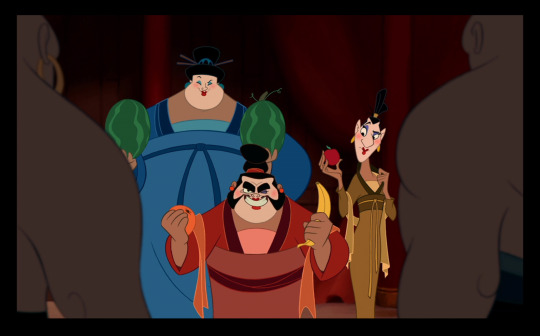
I had trouble posting this as a single thing, so here is a link to part 2: (Link)
#rants#literary analysis#literature analysis#what's so special about...?#character analysis#mulan#mulan 1998#fa mulan#disney mulan#disney princess#disney princesses#cinematography#cinema#lgbtqia#cinema therapy#watch movies#tumblr has an image limit so I had to cut down on some more finicky shot analysis#queer mulan#transgender#trans nonbinary#trans men are men#trans women are women#non binary#nonbinary#mulan is a queer story#meta#meta analysis
2 notes
·
View notes
Text
I wish that who uses only "she/her" or "he/him" referring to Mizu kinda get the drip that Mizu isn't neither a man nor a woman.
That whoever is using only one of these pronouns is actually seeing that Mizu is kinda beyond gender shit, and any other category.
So when using those are all in a genderqueer/genderfuck way. When calling them girlfriend or man or bf is in an ironic way.
I really wish I'm not seeing people thinking Mizu is a woman just bc they are AFAB or bc "this trope is ant-women" terf's shit. Cuz I guarantee that Mulan (1998) and Blue Eye Samurai (2023) aren't being feminist in a simple "We Can Do It, too" way, but rather "See, gender roles are stupid and fuck you if you think that genderqueer people don't exist and people are only MAN or WOMAN."
Man, I really hate when people look at a genderqueer story and think only in binary. Adult Mizu could have been a woman if they really were one, cuz the point of they being perseved as a boy was only to be more difficult to find them as a kid, when their mom couldn't protect them with her hands or power, cuz she had none.
I think that when they were in the wife role, they weren't really performing it as a woman, but more like a duty commonly attributed to wife (more like my father being the cook in the house and a really good caretaker who is really considering and cute, and also being the dad figure, when my mom is in the finances business of the house and isn't the best caretaker of all times...) and for they mom respect and consideration, cuz they loved her and wanted to show their love, retributing by marry that guy.
But they were rejected by their mom and their husband, when being their own singular self. When showing they weren't the wife, neither the woman people thought they should be.
Yes, they suit a masc appearance and mannerisms, but it seem dehonest to call them a man. They really don't perform a man image.
Just like non binary transmasc or butches... We aren't really men just bc we are mascs. And we aren't really, by the book, women, solely by the fact we are AFAB.
Why? Cuz it is just like that. Gender isn't the binary we were thought and I wish everyone a really good search and thinking on genderqueer thesis and documents, already documented discussions and a read on "Butch Blues", a watch on "Tomboy", etc.
#blue eye samurai#queer discourse#more like#queer rant#cuz im pissed fearing people are missreading the whole show#just bc Mizu is genderfucking around not giving a single shit about the binary#only doing what makes sense and (i also thinking) better suits and easy theirself in their skin#they wear a binder for fucks sake#it cant be thay they are binary#neither Mulan really was binary to be honest#look at how the movie ended#they weren't shouting “Im a binary woman human being”#they werent denying the improviment on self-realization that they had#also they were seemed to be kinda ok and enjoying it#not like “oh fuck I really hate being in this situation. being persived as a man”#fuck you if you dont agree#by the “but is better to be a men” logic trans women and transfem nonbinary people wouldn't fucking exist#soo fuuuuuck youuuuuu#im really not in to a discussion#this is my statement#not an invitation#if you disagree bc you think those points im criticizing are right#and you also want to talk???#i just want to punch you in the face you fucking transphobe#this is no discussion#and stop invalidating queer people's history. lives and ownselfs#fuck you#mizu
33 notes
·
View notes
Video
undefined
tumblr
LI SHANG from MULAN-(1998/2020)BISEXUAL (long post-important(to me!)!)
insider article LINK:
https://www.insider.com/disney-lgbtq-representation-mulan-remake-li-shang-2020-9
https://twitter.com/ThisIsGSage23/status/1654519300399456256?s=20
https://twitter.com/ThisIsGSage23/status/1770083032667472285
bi ig highlight : https://www.instagram.com/stories/highlights/18280848235083086/
https://www.tumblr.com/yourartmatters-itswhatgotmehere/754829814197796864?source=share

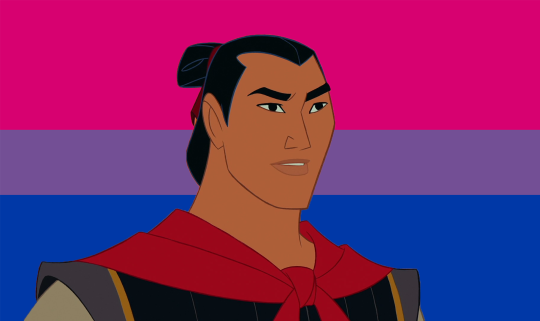
https://twitter.com/GeauxSeeTheLady/status/1769793417268093173
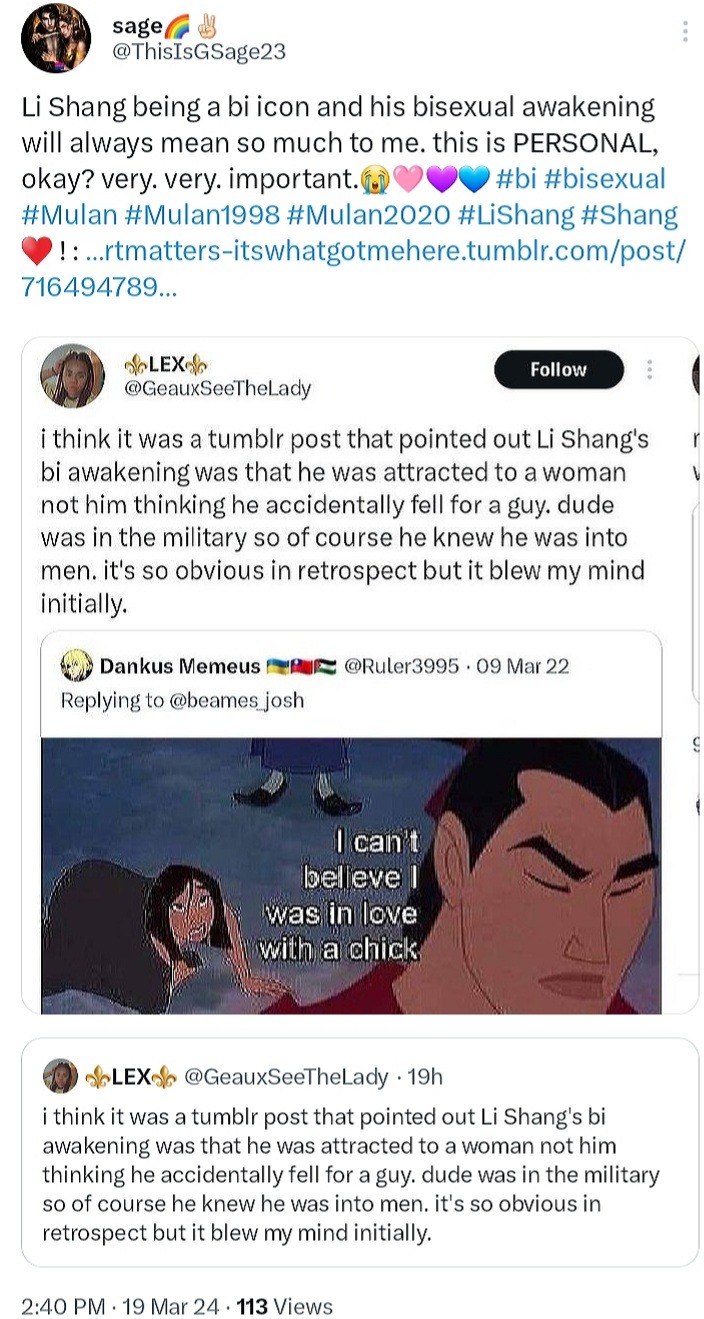
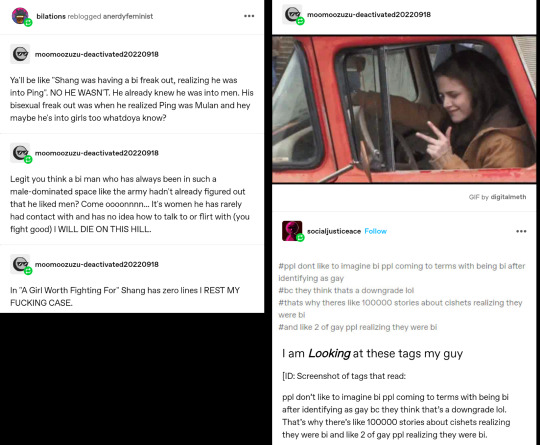
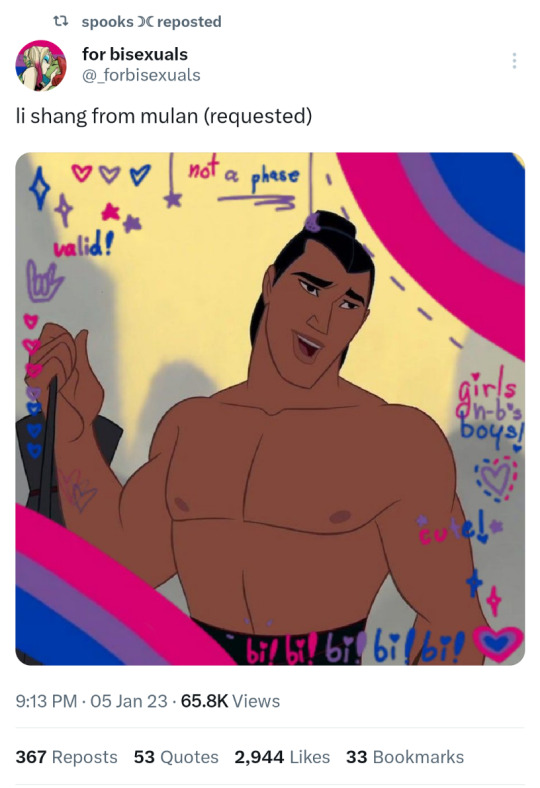
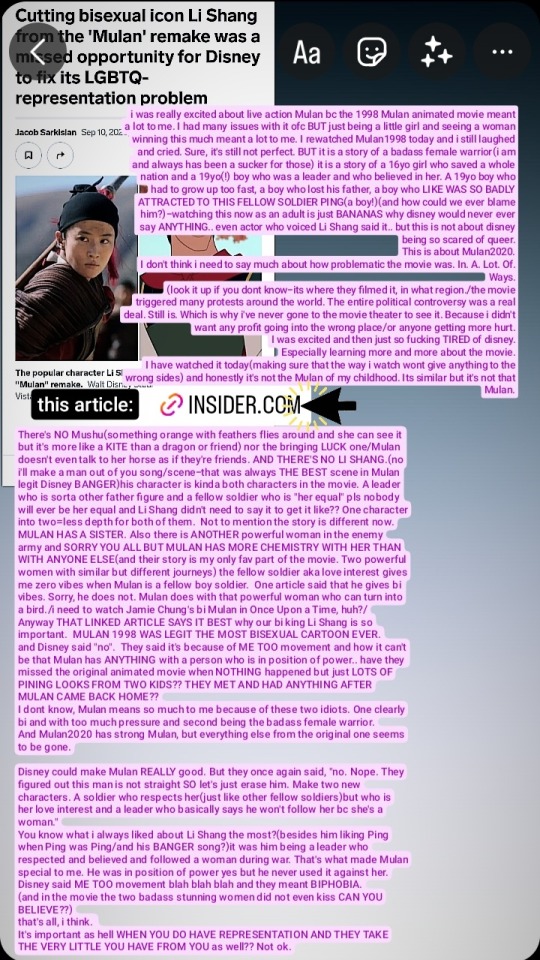
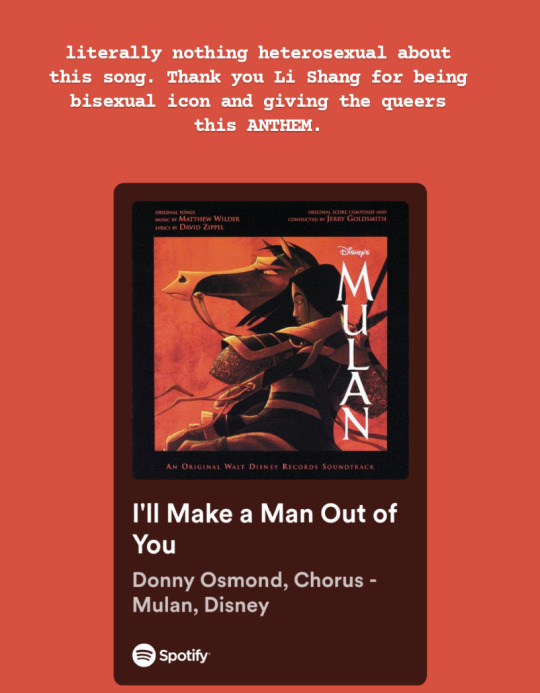
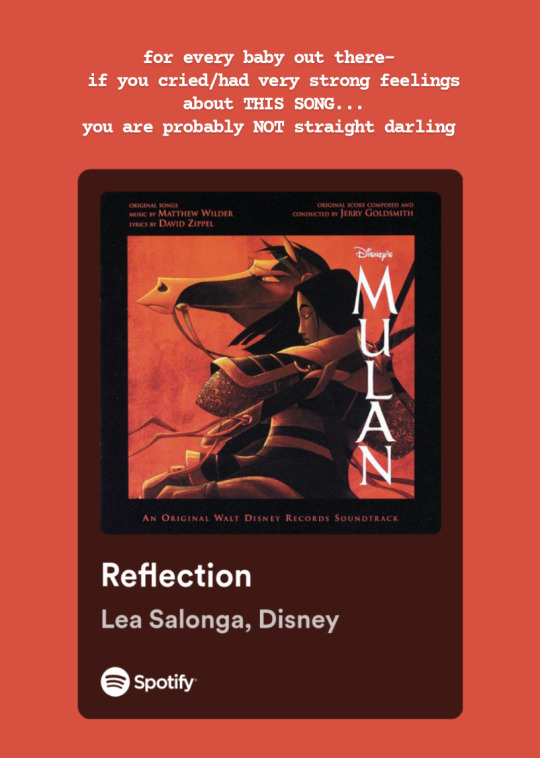


https://twitter.com/ThisIsGSage23/status/1654436342502244353?s=20
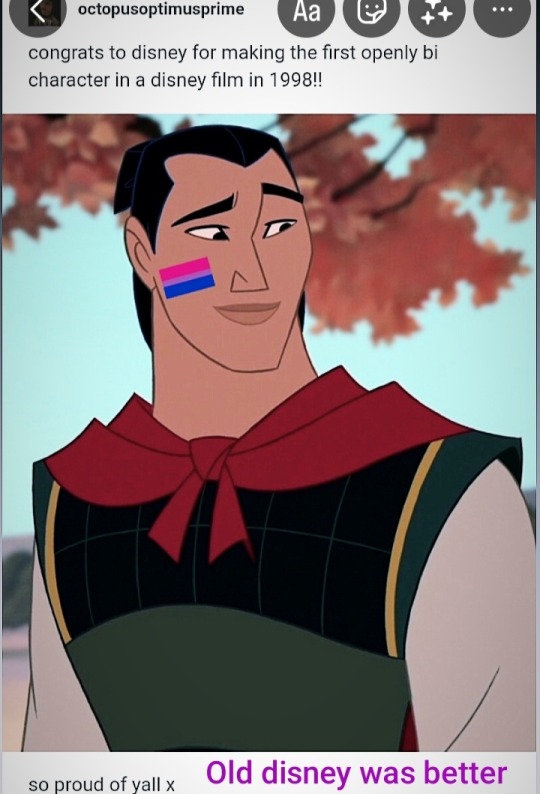
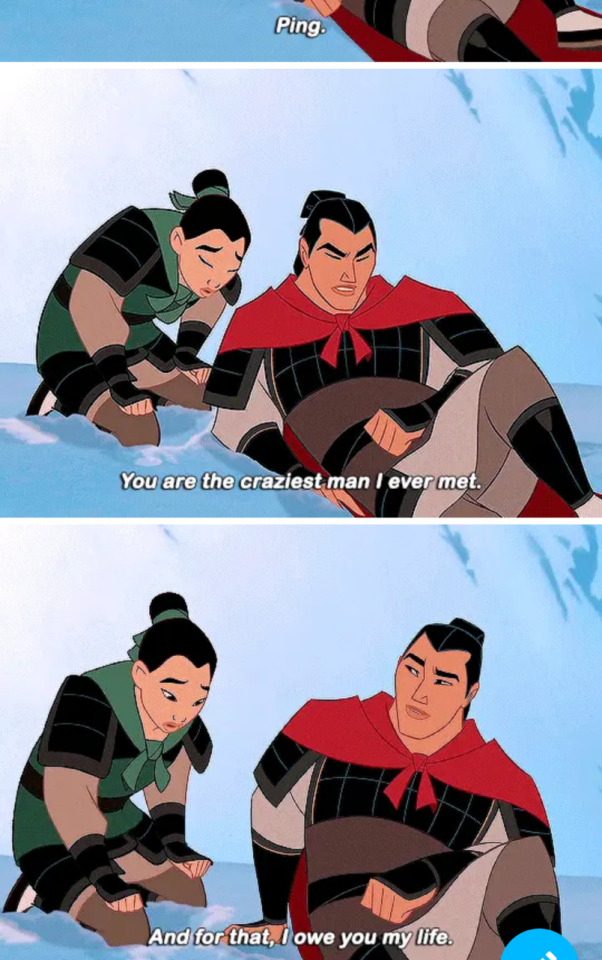
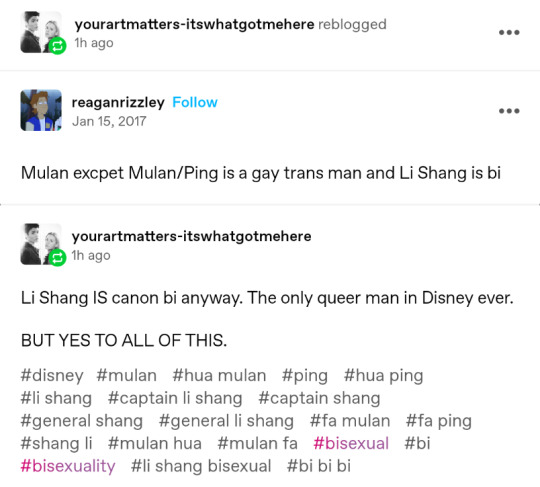
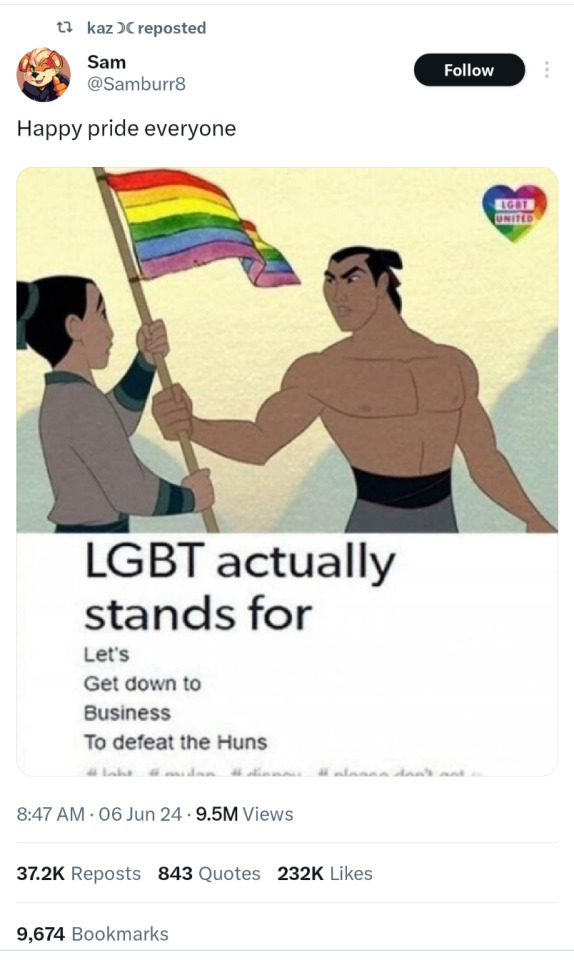
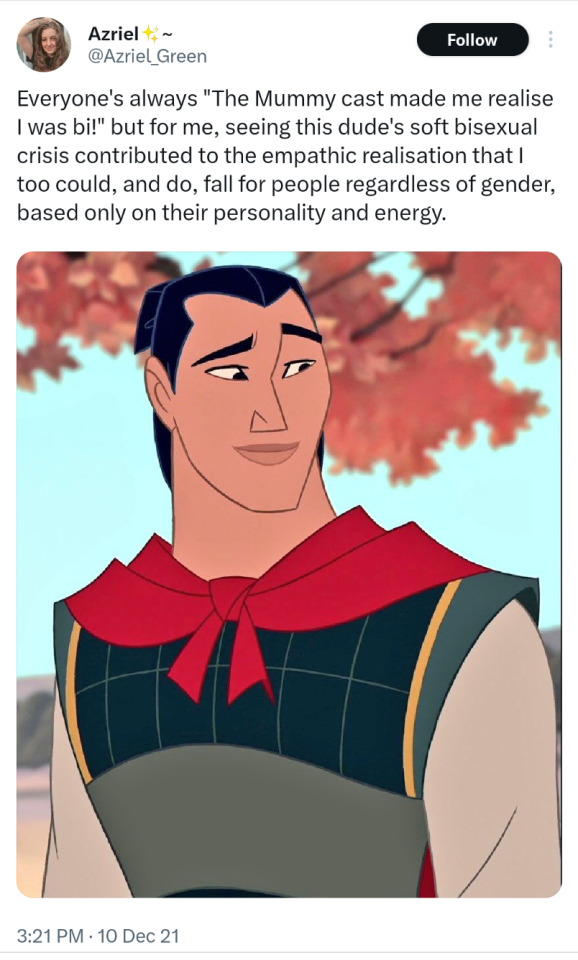
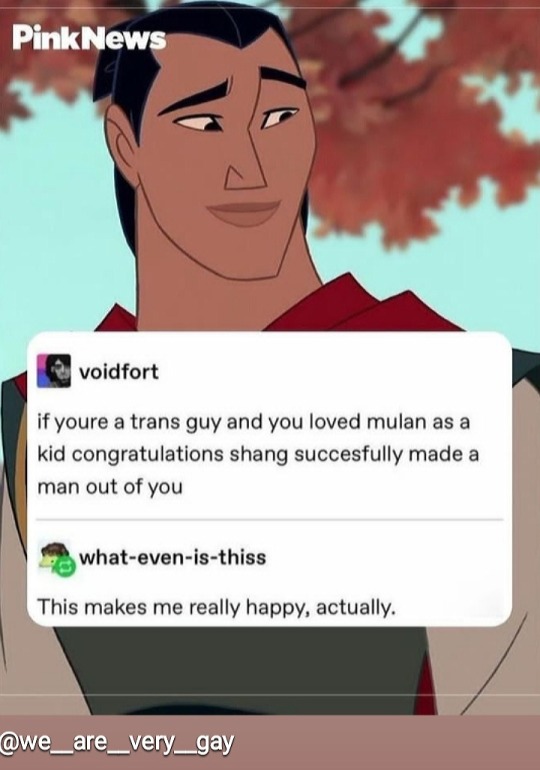
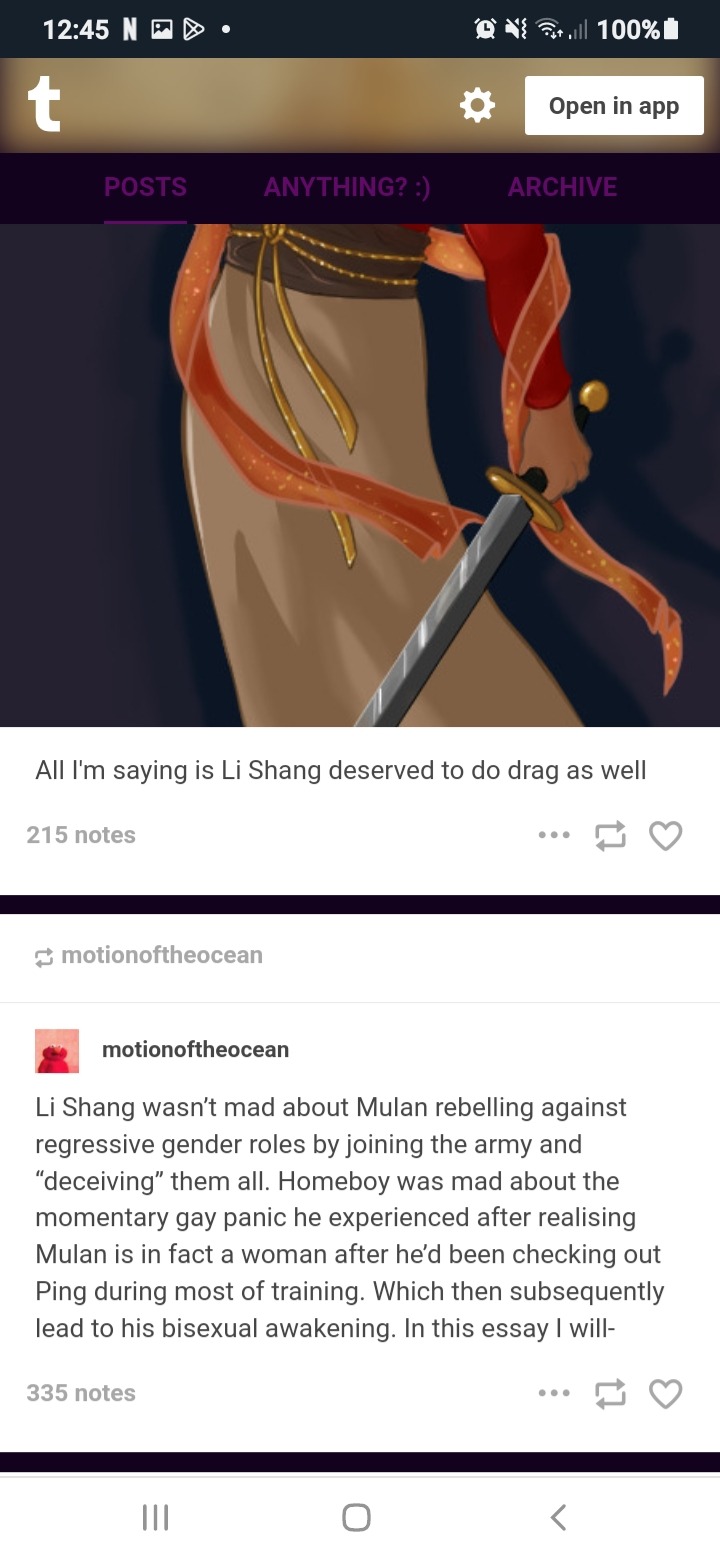
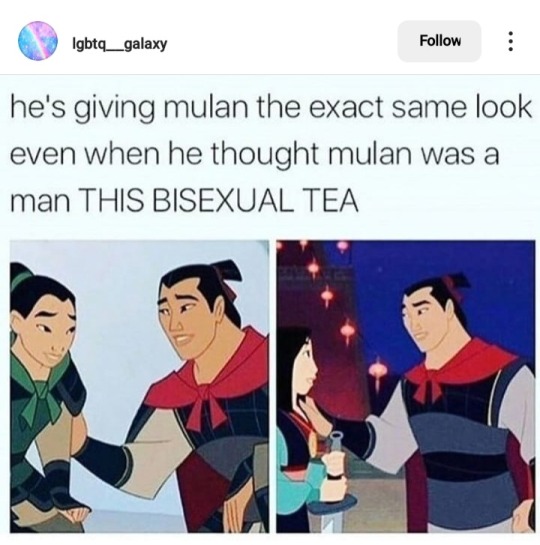
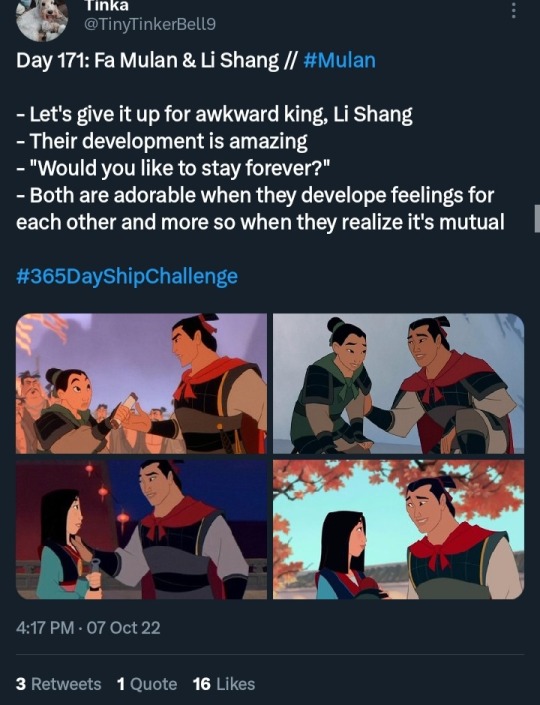



EDIT: https://twitter.com/notjonathankha/status/1302140198264819712?s=20

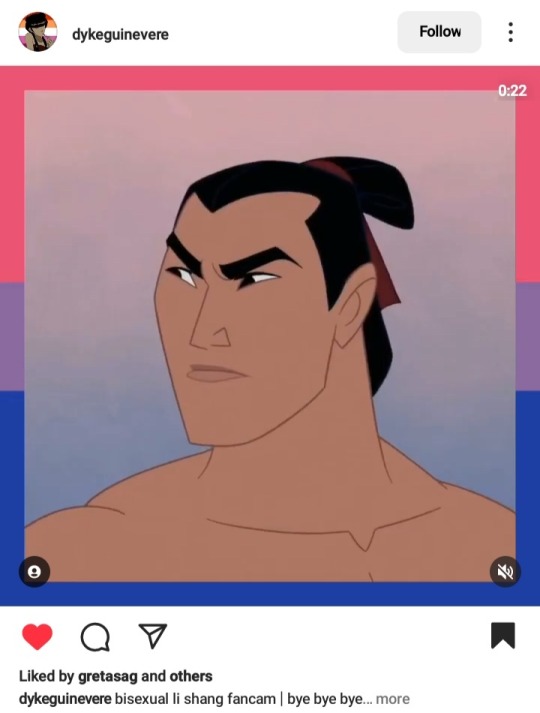
EDIT :
body > iframe { min-width: auto !important }
View this post on Instagram
A post shared by rey’s fancams (@dykeguinevere)
MULAN&SHANG EDIT:
body > iframe { min-width: auto !important }
View this post on Instagram
A post shared by @_heyo.edits_
edit that i REALLY love
Mulan-Ping&Shang-What Kind Of Man

youtube
https://twitter.com/ThisIsGSage23/status/1654507839849652225?s=20
AND ANOTHER EDIT I LOVE
Mulan-&Shang-Heart Attack
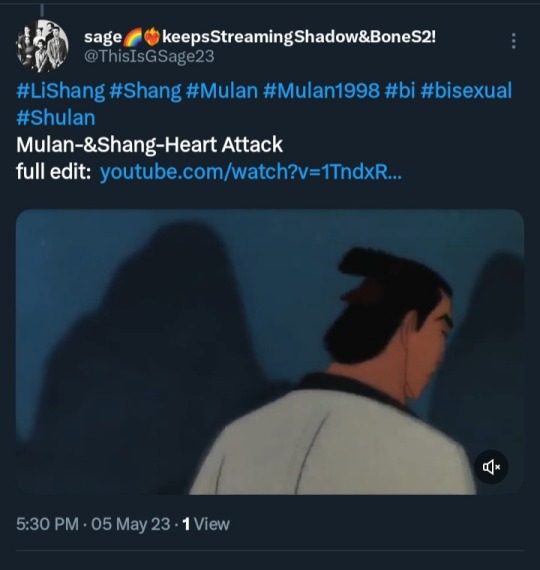
youtube
https://twitter.com/ThisIsGSage23/status/1654508809325359105?s=20
AND ONE MORE EDIT:
youtube
ALSO THE BANGER scene: I’ll make a man out of you
https://www.youtube.com/watch?v=TVcLIfSC4OE
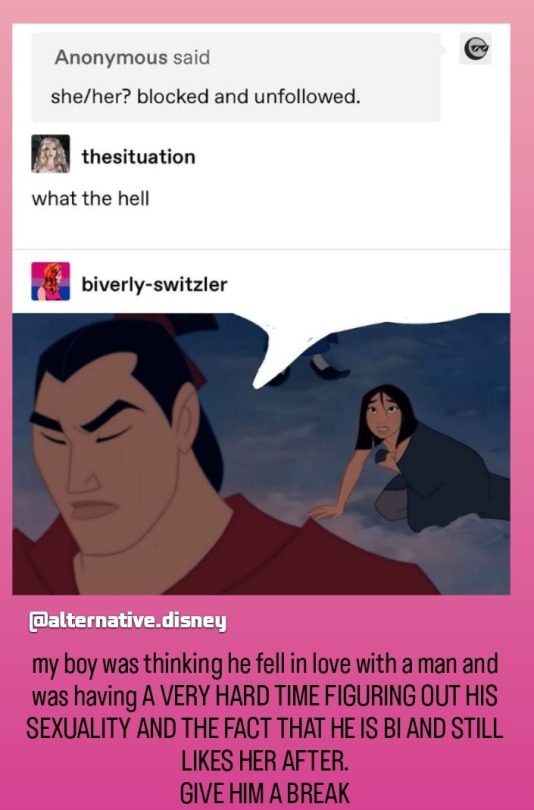
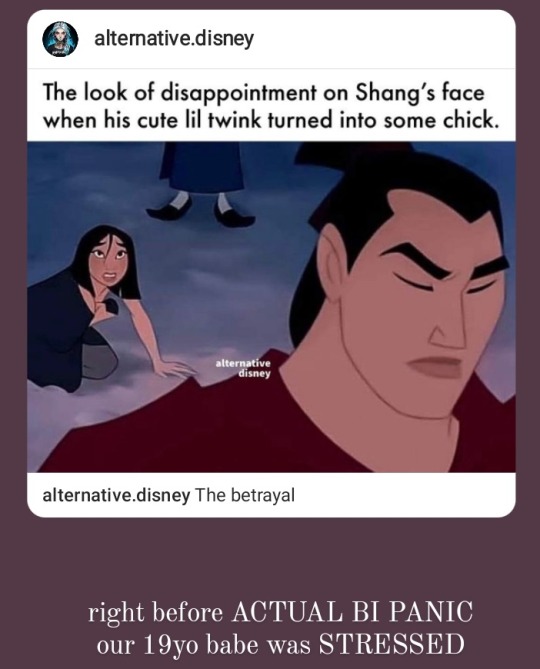
https://open.spotify.com/playlist/6vdBgNpWvIwjCLD2JrJwxj?si=20352d89048241b3

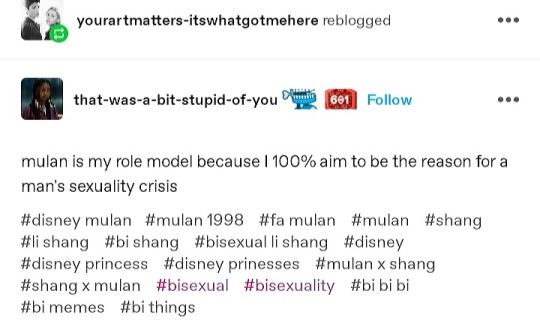

we need more bisexuality done right in media!!
https://yourartmatters-itswhatgotmehere.tumblr.com/post/746941244472786944/so-alright-here-are-the-moviesmedia-that-make
BOOKS TO LEARN MORE ABOUT BISEXUAL HISTORY & ACTIVISM: https://www.tumblr.com/ruimtetijd/686000390089621504/list-of-books-about-bi-history-and-activism-from &https://www.goodreads.com/review/list/139102124?shelf=bi-bisexual-characters-done-well
#li shang#shang#bi li shang#shang is bi#bi#bisexual#queer#lgbtq#Disney#mulan#mulan 1998#mulan 2020#shulan#mulan x shang#mulan x li shang#shang x mulan#shang x ping#li shang x mulan#li shang x ping#mulan and shang#shang and mulan#bi representation#bi disney#bisexual disney#bd wong#bi bi bi#bi tag#bisexuality#bi people#chaotic bisexual
95 notes
·
View notes
Text
Me every single time I found myself really liking a "hetero" ship :3







#shinogiyuu#shinobu kocho#giyuu tomioka#demon slayer#gabenath#gabriel agreste#fairy tail nalu#fairy tail#nathalie sancoeur#miraculous ladybug#tinkerbell#kristanna#kristoff#queen anna#mulan x shang#mulan 1998#starco#star vs the forces of evil#bisexual#headcanon#transmasc#disney#frozen#pansexual#aroacespec#omnisexual#transgender#queer#no heterosexual explanation
13 notes
·
View notes
Text
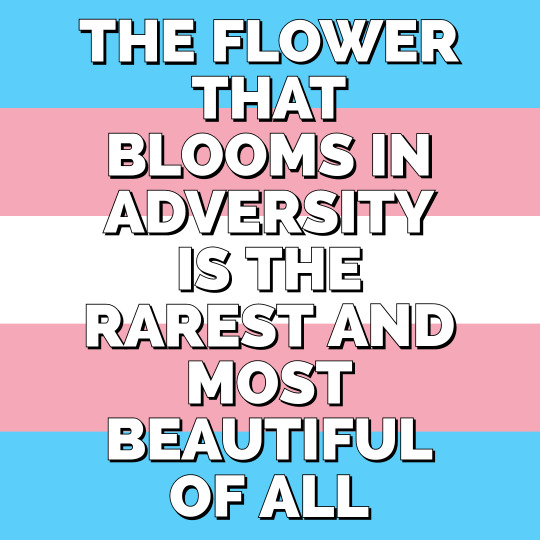
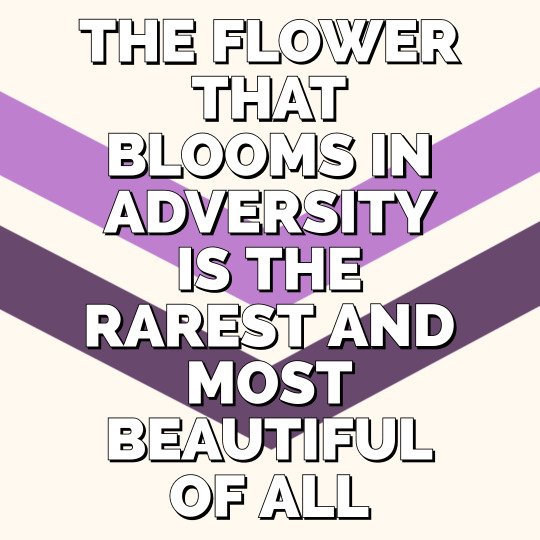
(ID: trans and queer pride flags with white text, a quote from the movie Mulan, the text reads "the flower that blooms in adversity is the rarest and most beautiful of all")
271 notes
·
View notes